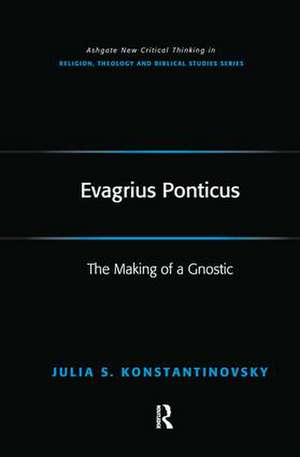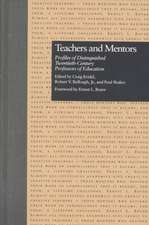Evagrius Ponticus: The Making of a Gnostic: Routledge New Critical Thinking in Religion, Theology and Biblical Studies
Autor Julia Konstantinovskyen Limba Engleză Paperback – 28 noi 2016
| Toate formatele și edițiile | Preț | Express |
|---|---|---|
| Paperback (1) | 397.27 lei 6-8 săpt. | |
| Taylor & Francis – 28 noi 2016 | 397.27 lei 6-8 săpt. | |
| Hardback (1) | 1054.71 lei 6-8 săpt. | |
| Taylor & Francis – 8 ian 2009 | 1054.71 lei 6-8 săpt. |
Din seria Routledge New Critical Thinking in Religion, Theology and Biblical Studies
-
 Preț: 295.00 lei
Preț: 295.00 lei -
 Preț: 310.22 lei
Preț: 310.22 lei -
 Preț: 326.73 lei
Preț: 326.73 lei -
 Preț: 311.41 lei
Preț: 311.41 lei -
 Preț: 302.06 lei
Preț: 302.06 lei -
 Preț: 313.38 lei
Preț: 313.38 lei -
 Preț: 310.80 lei
Preț: 310.80 lei -
 Preț: 293.81 lei
Preț: 293.81 lei -
 Preț: 326.55 lei
Preț: 326.55 lei -
 Preț: 309.23 lei
Preț: 309.23 lei -
 Preț: 311.59 lei
Preț: 311.59 lei -
 Preț: 324.89 lei
Preț: 324.89 lei -
 Preț: 340.66 lei
Preț: 340.66 lei -
 Preț: 311.03 lei
Preț: 311.03 lei -
 Preț: 311.41 lei
Preț: 311.41 lei -
 Preț: 401.91 lei
Preț: 401.91 lei - 28%
 Preț: 820.71 lei
Preț: 820.71 lei - 26%
 Preț: 764.69 lei
Preț: 764.69 lei - 18%
 Preț: 1059.45 lei
Preț: 1059.45 lei - 18%
 Preț: 1054.71 lei
Preț: 1054.71 lei - 18%
 Preț: 1054.71 lei
Preț: 1054.71 lei - 28%
 Preț: 823.34 lei
Preț: 823.34 lei - 18%
 Preț: 1054.71 lei
Preț: 1054.71 lei - 18%
 Preț: 1058.79 lei
Preț: 1058.79 lei - 18%
 Preț: 1054.71 lei
Preț: 1054.71 lei - 18%
 Preț: 1057.09 lei
Preț: 1057.09 lei - 18%
 Preț: 1055.51 lei
Preț: 1055.51 lei - 17%
 Preț: 190.88 lei
Preț: 190.88 lei - 18%
 Preț: 1056.28 lei
Preț: 1056.28 lei - 18%
 Preț: 700.75 lei
Preț: 700.75 lei - 18%
 Preț: 1054.71 lei
Preț: 1054.71 lei - 25%
 Preț: 767.07 lei
Preț: 767.07 lei - 26%
 Preț: 877.59 lei
Preț: 877.59 lei - 18%
 Preț: 1054.71 lei
Preț: 1054.71 lei - 18%
 Preț: 1057.89 lei
Preț: 1057.89 lei - 31%
 Preț: 765.40 lei
Preț: 765.40 lei - 18%
 Preț: 1054.71 lei
Preț: 1054.71 lei - 18%
 Preț: 1000.27 lei
Preț: 1000.27 lei - 30%
 Preț: 850.17 lei
Preț: 850.17 lei - 18%
 Preț: 1060.25 lei
Preț: 1060.25 lei - 18%
 Preț: 1059.45 lei
Preț: 1059.45 lei - 18%
 Preț: 1059.45 lei
Preț: 1059.45 lei - 18%
 Preț: 1000.27 lei
Preț: 1000.27 lei - 18%
 Preț: 1000.27 lei
Preț: 1000.27 lei - 18%
 Preț: 1054.71 lei
Preț: 1054.71 lei - 18%
 Preț: 1108.37 lei
Preț: 1108.37 lei - 26%
 Preț: 821.13 lei
Preț: 821.13 lei - 26%
 Preț: 820.32 lei
Preț: 820.32 lei - 18%
 Preț: 1054.71 lei
Preț: 1054.71 lei - 18%
 Preț: 1053.79 lei
Preț: 1053.79 lei
Preț: 397.27 lei
Preț vechi: 431.81 lei
-8% Nou
Puncte Express: 596
Preț estimativ în valută:
76.02€ • 79.57$ • 63.27£
76.02€ • 79.57$ • 63.27£
Carte tipărită la comandă
Livrare economică 31 martie-14 aprilie
Preluare comenzi: 021 569.72.76
Specificații
ISBN-13: 9781138278400
ISBN-10: 1138278408
Pagini: 232
Dimensiuni: 156 x 234 x 22 mm
Greutate: 0.43 kg
Ediția:1
Editura: Taylor & Francis
Colecția Routledge
Seria Routledge New Critical Thinking in Religion, Theology and Biblical Studies
Locul publicării:Oxford, United Kingdom
ISBN-10: 1138278408
Pagini: 232
Dimensiuni: 156 x 234 x 22 mm
Greutate: 0.43 kg
Ediția:1
Editura: Taylor & Francis
Colecția Routledge
Seria Routledge New Critical Thinking in Religion, Theology and Biblical Studies
Locul publicării:Oxford, United Kingdom
Cuprins
Contents: Preface; Introduction; Evagrius in situ: the making of a gnostic; Knowledge through mental faculties in relation to spiritual knowledge; Natural contemplation versus knowledge of God's essence; The intellect's vision of light; Christology; The last things; Conclusion; Bibliography; Index.
Notă biografică
Julia Konstantinovsky is a Research Fellow in Theology at Wolfson College and a senior member of the Faculty of Theology, University of Oxford, UK.
Recenzii
’... brings a shaft of light to the often dark and contentious world of Origenist scholarship. The very clarity with which Dr Konstantinovsky presents Evagrius’ teaching makes this book exceptionally valuable for exploring his influence... This is an important work that merits an attention as careful as the attention the author has brought to her sources.’ Journal of Theological Studies ’This book provides a critical and well-devised argument for understanding Evagrius as a Gnostic and would certainly prove to be very useful and stimulating for scholars of both ancient studies and spirituality.’ Studia Historiae Ecclesiasticae
Descriere
A revered instructor of the eremitic monks of Nitria, Sketis and Kellia, Evagrius Ponticus is a fascinating yet enigmatic figure in the history of fourth-century mystical thought. This historical and theological re-evaluation of the teaching of Evagrius brings to bear evidence from the Greek and Syriac Evagriana. Focusing on Evagrius' concept of perfection as the acquisition of spiritual knowledge, this book revisits current perceptions of Evagrius's thought and character by comparing and contrasting him with his contemporaries and predecessors, both Christian and pagan. Ideas of the three "Cappadocians" and the author of the Macariana, as well as Stoic, Neo-Platonic and earlier Christian writers such as Alcinoos, Plotinus, Clement and Origen, are all explored. Konstantinovsky draws attention to a lack of uniformity in the fourth-century views on the origin of the soul, the body-soul relation, and the eschatological destiny of humankind.















